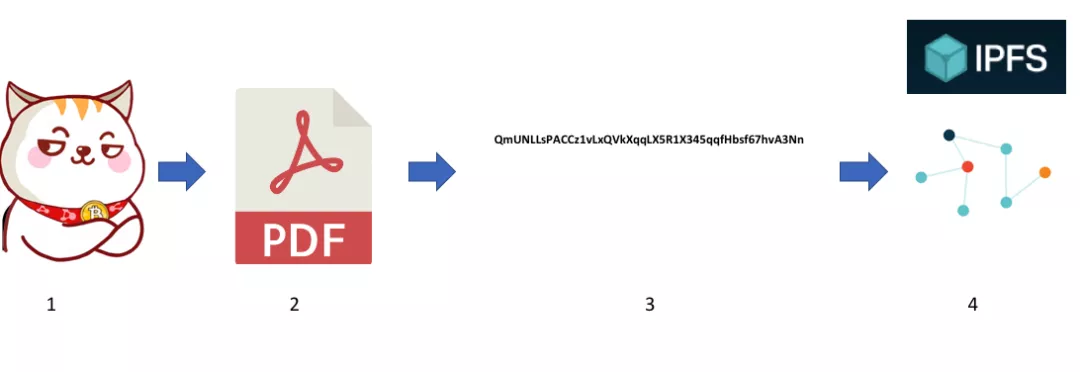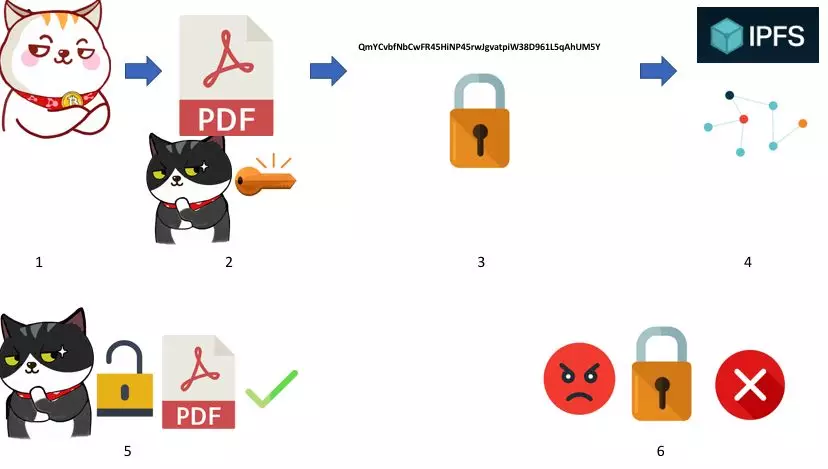A text saying that IPFS: What is the expectation of Filecoin?
Do you have such an experience: a friend shared a file link with a network disk. You didn't check it in time because you were busy. When you think about it , you find that " Oh, the page you visited does not exist. " ?

The shared file does not exist. It may be that the sharing link has failed. It may be that the file has been deleted or the network disk service provider has closed down (for example, a large-scale network disk closing tide occurred in 2016). , meaning you may have lost this file.
Not only the information on the network disk, when we visit some websites, we also encounter " 404 Page Not Found ". Website 404, it may be that the file on the server is permanently deleted, or the server is closed, whichever means, the webpage you are looking for disappears from the Internet.
Content can be permanently deleted, which is a significant drawback of current Internet-centric storage.
- The judge made a favorable Bitfinex ruling and rejected the file request filed by NYAG
- Monthly Report | September Domestic and Foreign Blockchain Policy: Virtual Currency Mining Supervision Strengthens Legal Digital Currency Multi-Country Support
- Zuckerberg "Second Palace" attends the hearing Libra can break through the blockade
The mainstream two network drives iCloud and Dropbox, 2TB storage space will cost more than 800 yuan per year, and Dropbox's 2018 financial report shows that the average user pays $117.64. The high cost of storage is another drawback of Internet-centric storage.
On August 23, Amazon Cloud Services AWS failed, causing a brief service disruption on many trading platforms within the blockchain industry. As more and more companies host their data and data on cloud servers such as Amazon AWS and Alibaba Cloud, once these centralized cloud service providers have problems or are attacked by hackers, the impact of the impact may be large. It is beyond the imagination of many people. Centralized storage is bound to face security issues.
In addition, the centralization of the Internet is stored in privacy protection, and it is not good enough. This is why a lot of privacy information, we have to use mobile hard disk backup, rather than directly stored on the cloud disk.
So, is there a way to make valuable content "long-term storage, low cost, good security, and strong privacy protection" ?
This is what IPFS (Star File System) has to do.

IPFS is known as "a new direction for Web 3.0". If successful, it will not only subvert the existing Internet storage model, but also become an important infrastructure for the blockchain.
Today, let's take a closer look at IPFS and its integration with blockchain technology.
01 What is IPFS?
The full name of IPFS is The InterPlanetary File System, which is translated into "interstellar file system." It is a point-to-point distributed file system with the goal of creating a more open, fast, and secure Internet that complements or replaces the existing Internet HTTP protocol.
IPFS is not a blockchain, nor a project, but an underlying network transport protocol. As mentioned above, if successful, it will become an important infrastructure for the blockchain.
The emergence of IPFS is inseparable from the HTTP protocol, so let's take a look at the HTTP protocol.

The HTTP protocol was proposed by Tim Berners-Lee, the father of the World Wide Web, in 1991, and mainly specifies the communication format between the client and the server.
For example, you are reading this article on your mobile phone's WeChat or on a computer (both clients), and the data in this article is actually stored on Tencent's server. HTTP is a network transport protocol. You can read this article stored on Tencent's server on any mobile phone or computer as long as you comply with this protocol.
It can be said that the development of the Internet is inseparable from the hypertext transfer protocol of HTTP, which is one of the reasons why Tim Berners-Lee can win the 2016 "Nobel Prize in Computers" – the Turing Award.
But with the explosive growth of the Internet, many of the drawbacks of the HTTP protocol have gradually emerged.
The HTTP protocol relies on a centralized service network. The server must be up and running 24 hours a day. If the server is shut down, page 404, the user will not be able to access it. In addition, there are defects such as high cost, vulnerability, poor security, and weak privacy protection mentioned at the beginning of this article.

In May 2014, Juan Benet, who graduated from Stanford University, proposed the IPFS and established the Protocol Lab in 2015 to develop IPFS. In 2017, Protocol Lab announced the establishment of the IPFS-based blockchain project Filecoin.
Unlike HTTP, which relies on a centralized service network, IPFS is a decentralized point-to-point hypermedia transport protocol that combines peer-to-peer networking technology, BT's transport technology, Git version control, and self-certifying file systems.
Seeing the above description, you may be "unclear" and look blank. Don't worry, let's take a simple example to show how IPFS works.
02 An example to understand the operation process of IPFS
Assuming that Dabai wants to upload a PDF document to an IPFS system, the first step is to add the PDF document to the IPFS client. The IPFS client will hash the PDF and give a hash value starting with Qm. A feature of IPFS is the replacement of traditional Internet domain-based addresses based on content-based addresses (hash values beginning with Qm).
The IPFS system then copies the PDF document into multiple copies and splits each one, and each part of the split is stored on the decentralized IPFS network node.
The reason for copying multiple copies is to perform redundant backups, so that even if some nodes are attacked or data is lost or offline, files can be found in other nodes, thus ensuring security. However, it should be noted that IPFS is also not 100% to avoid partial file loss.

If Dabai wants to share this PDF file with Xiaohe, then Dabai only needs to tell Xiaohe the address (the hash value at the beginning of Qm). Black can download this PDF document from the IPFS system by address.

The download process is similar to the BT download, which downloads different parts of the PDF from multiple nodes in the IPFS system and finally "splices" back to the original file because IPFS incorporates BT's transport technology. Therefore, compared to the traditional HTTP protocol, the client needs to load and transfer data from the centralized server. The IPFS transmission speed is faster and it is not easy to cause congestion. Traditional centralized servers are very easy to cause congestion due to too many visitors, such as buying train tickets for the Spring Festival home, and the website will be stuck from time to time.
The above is the workflow of IPFS.
It should be noted that IPFS is only a transport protocol and does not encrypt files, which creates privacy issues . Others only need to know the above PDF hash address, you can download this file from the IPFS network, which is obviously not what you want to see.
So how to solve this privacy protection problem? In addition, there are costs in storing files. Why do those nodes in the IPFS network help you store files?
At this time, it is necessary to play the role of the blockchain.
03 IPFS + blockchain
IPFS is just an underlying transport protocol. Blockchain technology can amplify the role of IPFS, and IPFS becomes an important underlying infrastructure for blockchains.
This is why the Protocol Lab, which proposes IPFS, needs to establish Filecoin, an IPFS-based blockchain project. The relationship between IPFS and Filecoin is like the relationship between blockchain technology and Bitcoin. The former is the underlying infrastructure protocol and the latter is an application.
So how does blockchain technology make IPFS more powerful? We still illustrate by example.
Dabai first added the PDF document to the IPFS client and encrypted the document with Xiaohe's public key. IPFS produces a hash address for the encrypted PDF document, and copies multiple copies at the same time. After disassembly, the distributed storage is distributed in different IPFS network nodes.

Dabai tells Xiaohe the hash address of the document. After downloading the encrypted PDF document, Xiaohe can unlock the PDF document with his private key. Other people on the network, even if they know the hash address of this PDF, download it will not open because there is no private key. The node that stores the document also protects the content in the document because there is no private key. privacy.
So, why are these nodes in the IPFS network willing to help store this PDF document?
This requires the incentive of the blockchain Token economic model.
For example, the Filecoin project, which is designed for valuable, re-referenced file storage, can be divided into two categories: storage miners and search miners.
Among them, the storage miner is mainly responsible for storage. For example, this PDF of Dabai will be divided into many parts and distributed in several hard disks provided by storage miners. The search miner is mainly responsible for data retrieval. When Xiaohe provided the hash value of Dahe to the Filecoin network, the search miner immediately found out that the PDF was divided into several parts and stored in which nodes, so that the small Black can be downloaded quickly.
When Dabai stores the PDF in the Filecoin network, it needs to pay a certain amount of Token to the miners, and the system will also give these miners Token rewards.
In addition to the reward mechanism, there is a penalty mechanism. For example, the storage miner needs to perform the Token pledge. If the storage task is completed, the pledge Token will be returned; if it is not completed, such as the midway file is accidentally deleted, or the storage hard disk fails, the system will deduct the miner's pledge. Token as a punishment.
This is the charm of "IPFS + Blockchain Technology".
04 summary
The founder of Leipzig Pool, Jiang Zhuoer, once said: "Bitcoin brings currency freedom, Ethereum brings freedom of ownership, and in the future economic freedom that can be expected, there is the freedom of legal currency brought by stable currency. Freedom of information from decentralized storage. "
If IPFS is successful, it will change the existing Internet storage model, and it can also provide storage support for many blockchain projects and DApp projects, which is why IPFS has the potential to become an important underlying infrastructure for the blockchain.
However, Filecoin, a blockchain project established by the Protocol Lab of the IPFS protocol, was originally scheduled to go online in 2018. It has been delayed until recently, it was announced that it will go online at the end of the test network and launch the main network next year.
The vision portrayed by IPFS is very good, but whether it can be landed, whether it can be applied on a large scale, or whether it can change the existing centralized storage model, everything will be tested by time.
Message mining : Do you want to realize decentralized storage as soon as possible? why? Feel free to share your opinion in the message area.
——End——
Original: JackyLHH
『Declaration : This article is the author's independent point of view, does not represent the vernacular blockchain position, and does not constitute any investment advice or advice. You are not allowed to reprint this article by any third party without the authorization of the "Baihua Blockchain" sourced from this article. 』
We will continue to update Blocking; if you have any questions or suggestions, please contact us!
Was this article helpful?
93 out of 132 found this helpful
Related articles
- September public chain observation: How to treat Bitcoin mining after the market?
- How to create an encrypted startup, you need to avoid the minefield
- Investment management company VanEck: Bitcoin is a great tool for diversifying your portfolio
- CFTC Chairman: ETH is not a security, it is a commodity; the forked asset should be classified into the same category as the original asset.
- The United Nations has set up a cryptocurrency fund to accept bitcoin and Ethereum donations.
- Facebook is putting pressure on the currency, and central banks are issuing digital currencies.
- Is the Ethereum TPS 2000 enough? The capacity expansion is not as good as the Optimistic Rollup of Plasma.





